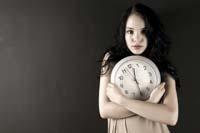Advanced puberty clock?

In European women the average of the first month is about twelve and a half years. But, of course, there are big differences between some cases and others. Experts believe that there are many reasons why puberty occurs sooner or later. For example, genetic factors are very important, as there are genes that determine when the puberty clock will start. Boys, for example, start puberty changes like their father. Girls, on the other hand, can be very similar to those of their mother as to the beginning of the rule, being able to have the last month on similar dates.
But in addition to genetics, there seem to be more factors that cause puberty to start up sooner or later. For example, in countries with a warmer and brighter climate puberty starts earlier than in other countries. The countries surrounding the equator are the ones with the most hours of sun and warmer temperatures.
The pediatric endocrinologist at Cruces Hospital, Amaia Vela, considers that in recent times there is a tendency to advance puberty by external agents, pointing out two factors as responsible for this trend.
The first cause could be environmental chemical pollution. In fact, some studies indicate that certain chemical compounds influence the growth, behavior, reproduction, and immune function of organisms, as they interfere with the endocrine system. These compounds have been called endocrine disruptors: alkylphenols (from household detergents and cosmetics), pesticides, plasticizers, petroleum derivatives or synthetic hormones. Some of them may be responsible for the beginning of female puberty progressing slowly. However, it is difficult to achieve clear and definitive results, as the chemicals involved are very numerous and the chemical impact young people suffer constantly changes.
The second factor can be food and, more specifically, obesity. In fact, it seems that gaining weight starts the clock and starts the hormonal mechanism that causes physical changes.
For this reason, overweight can considerably advance the rule of girls. "Fat girls - especially if they reach 45 kilometers very fast - can have the first month to turn nine, that is, they can mature physiologically three years before or before girls of normal weight," explains Basilio Moreno Esteban, head of clinical endocrinology at Gregorio Marañón Hospital in Madrid. In fact, "before it was thought that fat was a mere reserve, but now it is seen that it is an endocrine organ that generates several hormones," explains Amaia Vela.

That is why children who in pregnancy reach less weight than normal can start puberty earlier. "These children can gain weight quickly at first, that is, they can take too fast weight, and that seems to influence the early onset of puberty," explains Elizabeth Blardun, a child endocrinologist at Zumarraga Hospital.
A similar effect occurs with adopted children in developing countries: when the original quality of life and the situation of the environment is not good, or when there is previous malnutrition, and when changing to better, gaining weight causes early episodes of puberty.
But the opposite can also happen: poor nutrition can cause delayed puberty. In anorexia, for example, girls with eating problems may lose the rule if they do not gain weight. To start puberty the watch needs a specific weight, and these girls may not reach that floor. What happens to elite athletes is a similar effect: the requirement of a very low weight makes these girls can be without menstruations for years. There are examples known as rhythmic gymnastics.
Early episodes
Regardless of the agents involved, puberty that begins in girls before age 8 and boys before age 9 is considered early puberty. Pediatric endocrinologists believe that these cases should be analyzed in the consultation to identify the mechanism that has accelerated the puberty of these people. This is because, in addition to the external causes mentioned above, physical or hormonal or disease reasons can prevent the person from growing properly and reaching the corresponding height.

Another remarkable case is that of girls who start puberty between 8 and 9 years. In these girls puberty starts quite early, but also the development of this puberty can be fast. "When girls are accelerated, puberty is still very small psychologically and not prepared for that change," says Blardi. In these cases medication is used to slow down development but without stopping growth. That is, they grow the same and, meanwhile, "girls reach psychological maturity to face change," according to Blarduni.
Treatment involves injecting every three months to stop the production of hormones that produce estrogen and return to prepubertal hormone levels. This stops the development of puberty. But treatment is not now: it has been applied for more than 30 years and, according to the studies carried out, it does not seem to have long-term negative effects on patients. In fact, after several years after finishing treatment --18-22 years - girls have been studied to see if they had a proper hormonal function. Bone densitometries have also been performed to measure the amount of calcium in the bones. "The results have been absolutely normal. That is, its reproductive function and all biological function was fine," says Blardi.
For example, Elizabeth Blardi considers it important for parents to respond confidently and spontaneously to the changes children perceive. "Faced with any physical change, parents tend to think that the rule is there, but it is not. At 8 years old the first changes in girls can begin, but from there to be menstrual can take two or six years. That is, there is a lot of room." In this process, in addition, many times more than parents, it is children who accept their changes as normal and naturally.






